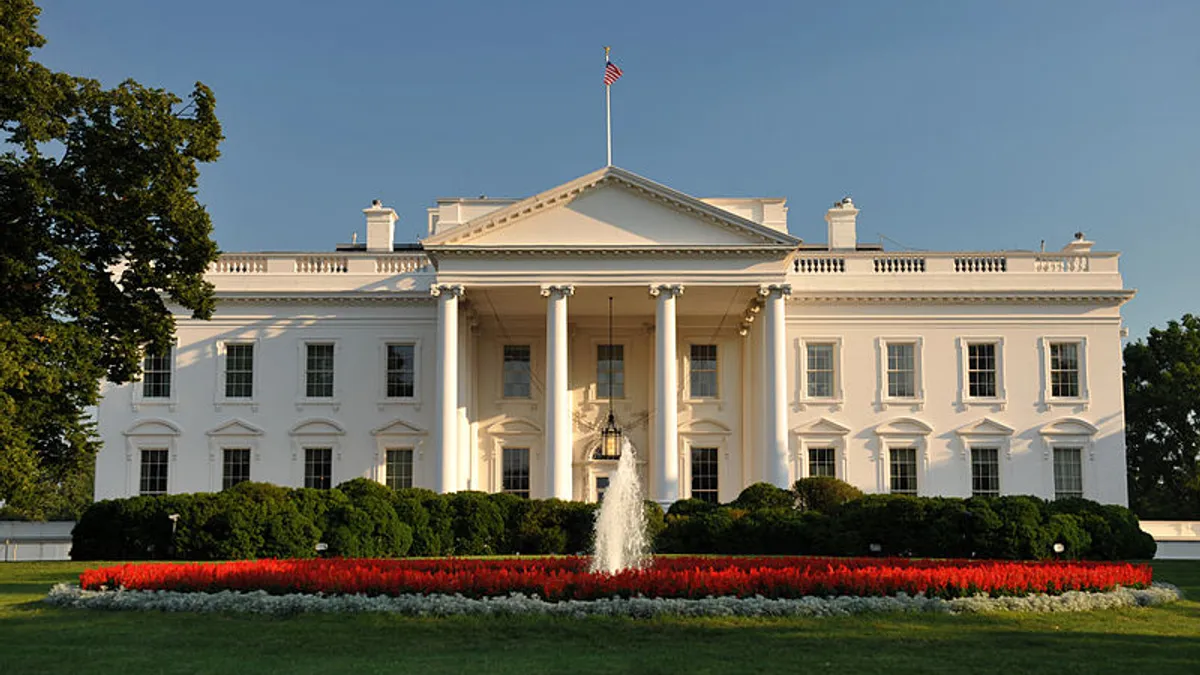Dive Brief:
- President Trump's budget proposal includes significant cuts to the Environmental Protection Agency, slashing the agency's budget by $2.6 billion to $5.7 billion — a cut of more than 31%. The budget is not expected to pass Congress as proposed.
- The White House is also proposing deep cuts to research at the Department of Energy. The Office of Energy Efficiency and Renewable Energy would see a 69% budget cut compared with 2016 levels; the Office of Fossil Energy budget would be reduced 44%; the Office of Nuclear Energy budget would decline by nearly 30%
- The White House also proposed to divest the transmission assets of three western Power Marketing Associations, including the Southwestern Power Administration (SWPA), the Western Area Power Administration and the Bonneville Power Administration (BPA).
Dive Insight:
Furor over the White House's preliminary budget proposal two months ago had little impact on the final proposal for fiscal year 2018, with the Trump administration continuing a mission to roll back regulations and reduce the government's role in energy development.
"We must eliminate every outdated, unnecessary, or ineffective Federal regulation, and move aggressively to build regulatory frameworks that stimulate—rather than stagnate—job creation," Trump writes in his budget message. "Even for those regulations we must leave in place, we must strike every provision that is counterproductive, ineffective, or outdated."
The budget slashes funding for regional EPA initiatives that are popular with lawmakers, including the Great Lakes Restoration Initiative and similar projects focused on cleanup and protection of the Chesapeake Bay and Puget Sound. And it would cut resources available to Superfund cleanup program, despite Pruitt's professed public support.
The budget would close down 50 programs and lay off about 20% of the agency's 15,000 employees. Already, reports emerged that EPA Administrator Scott Pruitt proposed to reserve $12 million for voluntary buyouts and early retirements.
Among the cuts are the popular Energy Star program and infrastructure assistance to Alaska Native villages.
The EPA budget proposal includes $100 million in savings by discontinuing funding for the Clean Power Plan, international climate change programs, and climate change research and partnership programs.
At DOE, the budget ax similarly fell hardest on programs focused on climate change.
The proposal would nearly eliminate DOE's Advanced Research Project Agency-Energy, cutting the program more than 93%. It would also make deep cuts to DOE programs focused on renewables, nuclear and fossil energy. Funding for carbon capture and storage would decline more than 84%.
In cutting ARPA-E, the budget explains that the "private sector is better positioned to finance disruptive energy research and development and to commercialize innovative technologies." That's an argument likely to run into opposition from lawmakers and the advanced energy sector, who argue the private sector is reluctant to finance early-stage energy projects until they move into the commercial stage.
Trump's proposed divestment of federal power assets in the western states is also likely to attract controversy. The White House argues that leasing PMA assets to the private sector will relieve deficit issues related to federal capital investments, but the nation's major public power trade groups have already expressed opposition.
The American Public Power Association said it was "disappointed" in the PMA divestiture proposal, and the National Rural Electric Cooperative Association said its members were "deeply concerned."
"Rural electric co-ops oppose any effort that would negatively impact the PMAs and threaten co-op communities with potential rate increases and uncertainty," the NRECA statement read.
While advanced nuclear research would be cut, the budget would set aside $120 million to restart licensing activities for the Yucca Mountain nuclear waste repository and to create an interim storage program. The agency's overall budget will see a 5.6% decline, but because it includes increases to the nuclear weapons program the cuts to energy research are deeper.
The budget is unlikely to be passed in its current form, with lawmakers from both sides of the aisle taking issue with the energy proposals other deep cuts to food assistance programs and Medicaid.
National Association of Clean Air Agencies Executive Director S. William Becker spoke to the Post before the budget was officially released, and said the White House does not appear concerned with the politics involved.
“You would think they would have learned something from these trial balloons. Instead, they’re doubling down. They just don’t care about the reaction," he said.
Editor's note: This story has been updated to reflect official budget numbers and the proposal to divest from PMA assets.














